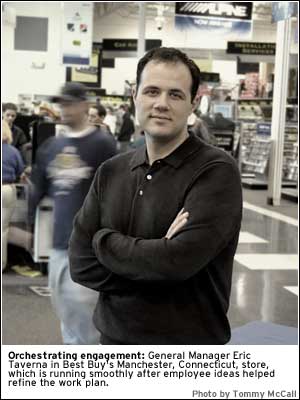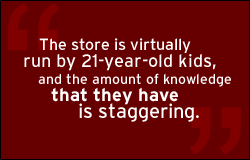Running a Best Buy store is no easy job. A typical 45,000-square-foot location is filled with thousands of different products -- from key-chain-sized computer micro drives to refrigerators, washers, and dryers. It's open 77 hours a week and is staffed by 120 employees, many of them young adults in their first or second jobs. The complexity of the products demands a high level of training, but the many distractions that tempt college-aged employees keep the turnover potential high.
An average store sells tens of millions of dollars in consumer electronics, computers, CDs, DVDs, and other merchandise in a year. But because it's a low-margin business, Best Buy keeps only a fraction of each sale.
And at the center of every Best Buy store is a general manager -- a young, friendly, air-traffic controller who is ultimately responsible for every aspect of its performance.
At the center of Store 484 in Manchester, Connecticut, is General Manager Eric Taverna, a 13-year retail veteran and Sam's Club expatriate in his third year with Best Buy.
Last summer, less than a year after assuming responsibility for the Manchester store, one of Taverna's most important challenges was how to harness the energy of the people in his store. Many associates thought their opinions didn't matter much to management and believed their colleagues weren't committed to doing quality work.
 |
Taverna tackled these problems by taking his employees' concerns seriously and building a plan based on their ideas. His approach -- and its positive, long-term effects -- offer lessons for managers across all industries who rely on employee commitment to make their businesses successful.
Tough feedback
As with any retail enterprise, there's a fine line between profit and loss at a Best Buy store. Staying on the right side of that line requires a manager who can balance many competing aspects of the business at once. Is staffing sufficient to meet customer needs, yet lean enough to keep prices competitive? Is security high enough to stop theft without irritating honest customers? Is everything clean and bright? Is everything properly stocked and labeled?
And beyond those basic issues: Are the employees engaged? Are associates -- often young people with one eye on the job and the other on this week's mid-term exam or this weekend's concert -- getting what they need from the company? Are they motivated to do a good job?
Extensive research conducted by The Gallup Organization shows that employee engagement has a substantial effect on many aspects of Best Buy store performance. Engaged employees are more likely to please the customer and more willing or better able to maintain store efficiency ratios. This is why the company includes employee engagement as a key item on each manager's scorecard.
Best Buy's July 2003 employee engagement research showed that the Manchester store was at a good -- but not great -- engagement level. Best Buy uses The Gallup Organization's Q12 process -- which centers on a 12-item survey that links to important business outcomes such as retention, productivity, profitability, customer engagement, and safety -- to measure employee engagement. (See "Feedback for Real" in See Also.) When compared to Gallup's database of workgroup engagement scores, Store 484 barely made the top third.
Employees gave two items particularly low ratings: "At work, my opinions seem to count" and "My associates or fellow employees are committed to doing quality work." Worse yet, although the overall engagement level had increased since the previous administration, scores on these two items went down.
"It was honest, and it hurt," Taverna says. "Getting feedback like that is gut-wrenching. That 'opinions count' thing really worried me. That just tells me we're not good listeners."
Moreover, he adds, "Many of the managers at my store have just been promoted to management for the first time, while others have been in the business for 20 years but have never focused on people or culture." Getting his entire management team effectively focused on the people issues "was a huge challenge."
To Taverna, the ability to motivate a team is a key part of managing. "Developing people skills, for myself and my managers, is the most important thing, because they in turn steer the whole ship," he says.
"The store is virtually run by 21-year-old kids," says Bob Gaudette, merchandising manager, "and the amount of knowledge that they have for being such young people is staggering."
 |
Working together
What did Taverna do about his store's mediocre employee engagement score and those two survey questions that were going the wrong direction? Taverna and his team of five assistant managers brought these issues up during their next quarterly all-employee meeting. The general manager took the employees through a simple straw-poll exercise that asked them to put a sticky note on the Q12 item they believed the whole store should emphasize. Not surprisingly, the notes accumulated around the item: "My associates or fellow employees are committed to doing quality work."
On the notes themselves, many associates suggested a solution. "We want 'team close,'" said some of the notes, meaning that employees wanted to close the store together. "We want everyone to be treated the same, and we want to walk out together as a team."
One of the complexities of running any retail business is closing the business for the day. When the last customer leaves, there's a flurry of activity to close down the registers, secure the day's receipts, and prepare for the next day. "You close to open," Taverna says.
At closing, everything needs to be cleaned. Shelves must be restocked. Hundreds of display items must be checked and turned off. And everything has to be ready to greet tomorrow's first customer, often less than 12 hours after today's last customer left. During the holidays, there's even more to be done and less time to do it because of the store's extended hours.
The situation in Manchester was complicated by differences in how one assistant manager or another would close the store. If an associate worked in a smaller department, he might be able to finish his area and be on his way faster than his colleagues in the larger departments -- or maybe not -- depending on the manager.
"To the associates, that's like a merry-go-round," Taverna says. "They start trying to manage the manager, because they know what manager X is going to expect versus manager Y, and maybe they can get away with certain things." Although the Manchester store closes at 9:30 p.m., it was not unusual for some associates to be in the store until almost midnight, while other employees were long gone.
Taverna and his five assistants developed a threefold plan for responding to their employees' concerns. First, all the managers had to be on the same page. "When I'm not in the store, and an associate comes to management with a problem, we all need to speak from the same shared values," Taverna says. "In reality, managers have days when they have to say no to associates. If associates think they can go to another manager and get a yes, that's a problem. We had normal struggles with that, and it's still a work in progress."
Second, associates who were not pulling their weight were asked to leave Best Buy. This management challenge appears at many companies that Gallup has studied: When productive employees are asked to give their all while slackers prosper, engagement suffers.
Third -- and most directly in response to what the employees of Store 484 requested -- Taverna and his lieutenants designed a "team close" procedure. "We had to make sure, one, that all the managers understood it, bought into it, and agreed it was the right thing to do," he said. "Two, we didn't just flip a switch and do it. We had to make sure we scheduled it properly. The last thing I wanted was to schedule someone until 10:30, then tell him, 'You have to stay until 11:30.' Then we went out to the store and started explaining, 'This is what we've come up with, and this is why.'"
|
Putting the plan into action
Reaction to the three-part plan was generally positive, but Taverna and his managers encountered some resistance, particularly among those who were satisfied with the time they were leaving the store. "Out of 120 people, maybe 10% might say, 'I don't like that.' Maybe another 20% might say, 'We'll see.' Maybe 70% would buy into it. That's normal, and we understood that," Taverna says. "The turning point was that all the managers and all the supervisors supported it."
The new plan was put into action as the 2003 holiday season approached. There was some friction. "Occasionally you'd hear some rumblings, or one of the supervisors would come up to us and say, 'So-and-so's walking around the store saying this team close really stinks,'" says Gaudette. But, adds Taverna, "The message needed to be, 'We're one store, one team, and we've got to help each other out.'"
Other employees appreciated that their idea had created an important change in the store, and few could argue with the logic. "The majority jumped on because it was an idea they'd had themselves," says Mike McCormick, inventory supervisor. "It was something they wanted to see happen."
The "team close" concept needed to be refined after its introduction. "In the beginning, everyone was made to stay," McCormick says. "We realized that you needed to schedule for team close, but the people who were scheduled to go home two hours before close needed to go home. We can't have the whole store staying because then you're running into too many labor hours."
The real measure of whether team close -- and whether the risk Taverna and his managers took in listening to their employees -- was a success came with the next Q12 administration in January 2004. "It was nerve-wracking because we tried to do something we hadn't done before in the store," Taverna says. "We were concerned that we were going to get some backlash."
The Q12 results confirmed the value of listening to employees and making changes in response to their suggestions. Store 484's employee engagement score jumped from good to great -- to the top 10% of the workgroups in the Gallup database. And there were solid increases for both the "associates committed to quality" and "my opinions count" items on the survey. Not coincidentally, the Manchester store is performing well against budget and -- in a high-turnover business -- has substantially lowered its turnover.
Similar stories, repeated across more than 600 Best Buy stores in the United States and Canada, have raised the company's overall engagement level to an all-time high. While increasing engagement is a company initiative, the wide variation in engagement levels -- store by store and work unit by work unit -- throughout Best Buy and other large firms demonstrates that engagement is created and maintained at the local level.
"When I heard our new scores, shivers went through my body," Taverna says. "Maybe when people took the survey, they were able to look back and say, 'You know what? It was the right thing to do.'"
|